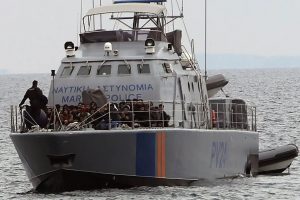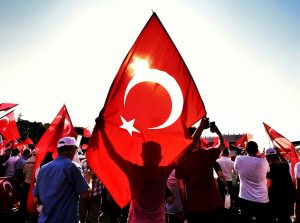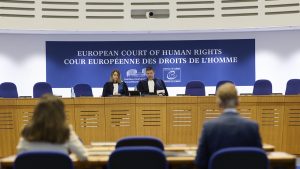By: Emma Bissell
Impunity Watch News Staff Writer
Slovakia – The ECHR held that the State of Slovakia violated a woman’s Article 4 rights which protect from slavery and forced labor and required the State to pay 41,000 Euros in damages.
 |
Applicant B.B., a Slovak national, was initially raised in State care before moving in with a family, for whom she worked as a maid. She eventually was kicked out of the home and found herself homeless. In 2010, it was arranged by an unnamed party, “Y”, for B.B. to go to the United Kingdom with him, work as a prostitute, manage his household all while earning no money. With no other alternative to homelessness, B.B. went willingly.
Two years later she was taken in by the Salvation Army and returned to Slovakia in 2012 under a program for the support and protection of victims of human trafficking. She was then registered with a state supported charity for human trafficking victims, Charita, until the government ultimately informed the charity that “Y” was charged with pimping instead of human trafficking; the group then had no choice but to release her from their care.
This misstep did not cease Charita’s efforts to support the applicant as they continued to send information concerning the ordeal in the UK to the Banska Bystrica police. The force noted the human trafficking concerns, but, due to jurisdictional issues, the case was sent to the Humenne police force who treated the conduct as pimping despite investigators from the UK concluding that B.B. had been trafficked.
In November of 2015, Y was found guilty of pimping and sentenced to one-year in prison, a far shorter sentence than that of a human trafficking conviction. The judgment was appealed to and affirmed by the regional court. In 2017, both the Minister of Justice and B.B. herself launched 3 total complaints each of which were unsuccessful in the Supreme Court.
The complaints specified that the Slovakian authorities’ failure to treat the offense as one of human trafficking had violated B.B.’s rights under Article 4 of the European Convention on Human Rights. This article, meant to prohibit slavery and forced labor, includes an obligation to carry out an effective investigation into a credible suspicion of human trafficking; the state did not conduct such an investigation.
Eventually, this case was brought to the European Court of Human Rights in September 2021. The court had two issues to resolve:
- Whether the State was obligated, under Article 4 of the Convention, to carry out an effective investigation into the credible claim of human trafficking.
- Whether the State complied with such an obligation, if it existed.
The evidence of this case supported the presence of such credible suspicion of human trafficking especially when considering B.B.’s vulnerability and lack of a reasonable alternative. The court held that Article 4 does create an obligation to critically investigate national and transnational trafficking regardless of whether it was a part of an organized scheme or whether it was an independent instance. The court found that the State did not uphold its obligation and thus violated B.B.’s article 4 rights.
The initial categorization of this conduct as pimping, rather than human trafficking, permitted “Y” to escape liability for violating a fundamental human right. This violation persisted when the State failed to investigate despite sufficient evidence and numerous appeals. The lenient sentencing on this matter undermines deterrence, safety, and effectiveness of both Slovakia’s counter-trafficking efforts and the Convention of Human Rights as a whole.
Ultimately Slovakia has to pay B.B. 26,000 euros in respect of non-pecuniary damages as well as 15,000 euros with respect to litigation costs and expenses.
For further information, please see:
ECHR – Judgement in the Case of B.B. v. Slovakia – 24 Oct. 2024
ECHR – Judgment Concerning Slovakia – 24 Oct. 2024
ECHR – Trafficking in Human Beings, Fact Document – 24 Oct. 2024
Equality and Human Rights Commission – Article 4: Freedom from slavery and forced labor – 4 May 2016



